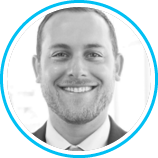supported by


Dr. Shafer is a cataract, refractive, cornea, and glaucoma specialist. In 2023, he founded the Shafer Vision Institute in Plymouth Meeting, Pennsylvania.
1. Please share with us your background.
About 100 years ago, my family left Eastern Europe and landed in Philadelphia—and we never left! I grew up in the northern suburbs of the city in a loving family, with a beer salesman for a father and a fourth-grade teacher for a mother. My older sister and I grew up surrounded by our cousins and grandparents, and we were fortunate to be immersed in nothing but love.
I went to college at the University of Rochester, where I studied molecular genetics and found a passion for teaching and research. I returned home to attend medical school at Temple University School of Medicine, and during my second year I met my life partner, my wife Morgan. I completed ophthalmology residency at the University of Pennsylvania’s Scheie Eye Institute and then moved the whole family to the tundra of South Dakota to do a fellowship in cornea, refractive, glaucoma, and complex anterior segment at Vance Thompson Vision. While we were there, my wife gave birth to our son, Devin, who is now 19 months old and the most incredible part of our lives.
We moved home at the end of my fellowship, and I joined Chester County Eye Care, a multispecialty ophthalmology practice serving Chester County, Pennsylvania, which is located right outside Philadelphia.
2. What drew you to ophthalmology and, specifically, to your field of interest?
When I started medical school, I was sure that I would become a family practice doctor. I entered medicine to help provide patients with meaningful improvements in quality of life, and I naively thought that I could do that best in family medicine. When I rotated through that specialty, however, I was struck by how drained I was from completing medication reconciliations all day and referring patients to specialists. I then did my rotation in surgery and felt invigorated by the prospect of solving a patient’s problem with my own hands. The challenge there was that everything was a matter of life and death, and I felt like we were prolonging suffering rather than improving quality of life.
Looking to learn more about ophthalmology specifically, I completed a 4-week elective, during which everything changed. I realized that ophthalmology was the confluence of my passions: improving patients’ quality of life by performing surgery to fix their problems! Within the field, I found the anterior segment space, particularly refractive surgery, to be most fitting for me, as it focuses almost entirely on quality of life.
3. Please describe your current position.
I am a cataract, refractive, cornea, and glaucoma specialist at Chester County Eye Care, an incredible practice in the greater Philadelphia area. I am the sole surgeon in my office in Malvern, Pennsylvania, although within the practice there are also two retina specialists, two glaucoma specialists, and a cornea specialist at offices 20 minutes from mine. As the only ophthalmologist in my office, I have been able to help set a culture of positivity and kindness, with an emphasis on the patient experience. I see patients in the office around 3.5 days a week, and I operate 1 day per week at two surgery centers. I spend a half day per week on practice development and meet with local optometry practices. I have incredibly supportive partners, and I am having fun helping them follow their dreams!
4. Who are your mentors?
Mentorship is a hot topic. For many, mentorship is formally arranged through organizations. I am fortunate to have a set of mentors that has assembled organically and authentically.
Stephen Orlin, MD, is like my ophthalmology dad. Every time I hang up the phone with him, my wife whispers, “Love you!” because it feels like that’s how the conversation should end. Dr. Orlin is a cornea specialist at Scheie Eye and is the complete package as a doctor: He is kind, caring, skilled, ethical, and supportive and always puts the patient first. I am so grateful for his continued support, even as I left the academic circle and moved into private practice.
John Berdahl, MD, is the man who taught me how to think. It is rare to find someone as motivated, passionate, and accomplished as John—and even rarer to be able to spend a year by that person’s side. John has taught me about the endless possibilities of innovation in ophthalmology. I could go on forever, but, suffice it to say, he really is that good.
It is hard to believe that a human can be as loving, kind, and skilled as Vance Thompson, MD. He and I really do hang up phone calls with, “I love you, buddy.” Vance has taught me about the people side of medicine, and I feel lucky to be a part of his life.
Entering the job market as a junior associate in the era of private equity is overwhelming. I am exceedingly fortunate to be mentored directly by my caring colleagues, Cristan Arena, MD; John DeStafeno, MD; Bruce Saran, MD; Michael Ward, MD; and Gregory Oldham, MD. Our practice has existed for 50 years, and it is due to their persistent goal of delivering high-quality care.
o Truthfully, the people who have taught me the most in recent months are my peers. This is not an exhaustive list, but I live for the text threads that I share with Neda Shamie, MD; Michael Greenwood, MD; Brandon Baartman, MD; Russell Swan, MD; Daniel Terveen, MD; J. David Stephens, MD; Caroline Wilson, MD; Caroline Watson, MD; Morgan Micheletti, MD; Brett Mueller, DO, PhD; Matthew Brink, MD; Dagny Zhu, MD; Neda Nikpoor, MD; Arjan Hura, MD; Nandini Venkateswaran, MD; Josh Frenkel, MD, MPH; Cristos Ifantides, MD; and more (sorry to anyone I forgot to mention!).
5. What has been the most memorable experience of your career thus far?
The most pivotal experience of my ophthalmology career took place when I was a second-year resident at the ASCRS Young Eye Surgeon conference. I entered the wet labs and rotated from station to station before arriving at the manual limbal relaxing incision area. I sat down and asked the proctor to show me how to use a Mastel instrument, and he said “Well, I’ve never done this before, but I bet we can figure it out together.” That proctor was Dr. Baartman, who was the prior year’s fellow at Vance Thompson Vision.
Brandon told me all about a fellowship that offered thousands of cataract surgeries as well as hundreds of corneal transplantations and glaucoma surgeries, with the opportunity to learn from Drs. John Berdahl and Vance Thompson, two giants in the field. I remember feeling simultaneously inspired and disappointed, as I did not think it would be possible to move my family to South Dakota. My wife, Morgan, is a veterinarian and was established in a practice on a partnership track—we were planning to stick it out in Philly.
Serendipitously, 3 months later, Morgan’s job situation changed, and we became free agents again. I reached back out to Brandon, who graciously offered continued guidance for me. I ended up spending my vacation during my third year of residency at Vance Thompson Vision to see if it would be a good fit, and it was!
Little did I know that sitting down at that wet lab station would set me up for training in the highest-volume surgical fellowship in the country and all the opportunities that have followed. Now, I consider Dr. Baartman, along with former and current fellows Drs. Greenwood, Swan, Stephens, Terveen, and Wilson, to be like siblings. It’s incredible how a small interaction can shape an entire future.
6. What are some new technological advances you find to be particularly exciting? Which advances in the pipeline are you most enthusiastic or curious about?
I think back just 3 years ago to the technology that I trained on in residency and compare it to the technology I use today. Although there is significant overlap, I am amazed by the options we now have for patients. My two main focuses in ophthalmology are providing spectacle independence and providing drop independence in glaucoma. I think about them as very similar and, in fact, parallel goals.
On the spectacle independence front, IOL options are exploding. I approach every patient as a candidate for the PanOptix IOL (Alcon) until proven otherwise, and previously a lack of candidacy meant a monofocal lens would be used. Now, with the AcrySof IQ Vivity IOL (Alcon) and the Light Adjustable Lens (RxSight), almost every patient can achieve added spectacle independence after cataract surgery. Sure, 100% spectacle independence at near may not always be possible, but computer glasses are becoming a thing of the past.
On the drop independence front, I am extremely excited about drug delivery options for patients. Although our retina colleagues are years ahead with products such as the dexamethasone intravitreal implant (Ozurdex, Allergan), we on the glaucoma side now have access to the bimatoprost intracameral implant (Durysta, Allergan). This represents our first step toward drug delivery as part of the glaucoma treatment algorithm! Although continued innovation is warranted, I think about it like the first-generation iPhone—remember how amazing that device was? The iterations since then now make it look ancient. The next 5 years will revolutionize the drug delivery space, and I am excited to be a part of it.
I am eager to see how presbyopia-correcting eye drops will change the paradigm as well. I wrestle with this approach because, while it appeals to the spectacle independence side of my interest, it adds a drop! However, I do think that it will change the landscape and will provide more spectacle independence after cataract surgery in patients with pupil-dependent IOLs such as the Vivity.
7. What is the focus of some of your research?
The addition of investigator-initiated trials to the private practice research armamentarium has been incredible. As a new practitioner, I am just initiating some of my first trials for which I am the principal investigator. My research interests, as stated above, involve IOL technology, drug delivery, and presbyopia. Check back with me at ASCRS for some (hopefully exciting) updates!
8. What is a typical day in your life? What keeps you busy, fulfilled, and passionate?
My wife Morgan makes fun of me because I wake up each day at 6:30am or so with all the energy in the world. I greet her and our son Devin with a big hug and a kiss, and we often sing a song and dance together. I get ready for work and typically leave the house around 7:15am. On average, each week I spend 1 day operating, 3 days seeing patients, and 1 day focusing on practice development.
My clinic days are great because I have a phenomenal staff and a brand-new office with the latest technology. My patients are incredible, and I have fun going from room to room helping people improve their quality of life. I see an interesting mix of cataract, refractive, cornea, glaucoma, and complex anterior segment patients, most of whom are surgical in nature. My OR days are growing in volume each week, and my surgery centers are learning to do some new surgeries that have not been offered in our area before!
I am usually out the door by 4:30pm, and I go to pick up Devin from daycare. It is the best feeling in the world when he sees me, smiles, and runs toward me. Morgan and I rotate who cooks dinner, and we play around as a family and FaceTime our loved ones for a couple of hours before putting Devin to bed. I then get to work, and most nights I either have a speaking engagement, work on research, edit surgical videos, or just read. We love going to bed early, so I usually fall asleep watching “Futurama” or another adult animated show (yes, I am a child at heart!).
I truly love our beloved profession, and I have sacrificed many of my former hobbies (gardening, fishing, guitar) to focus on my early career. I have no regrets about it, as everything I do is soul-filling. My family comes first, and they are on the forefront of my mind 100% of the day. It’s not hard to find passion when you focus on the one thing that matters: love.
9. What advice can you offer to individuals who are just now choosing their career paths after finishing residency or fellowship?
Always put family first, and everything else will fall into place. Don’t forget that innovation happens as much, if not more, in private practice as in the ivory tower. Remember to be kind to everyone you meet.
10. Tell us about an innovative procedure you are performing or a new imaging/diagnostic tool that has improved your practice.
One device that I have been playing around with in the wet lab is the new intraocular punch designed by Diamatrix and my good friend Morgan Micheletti, MD. As the only surgeon in my county of 700,000 people who performs secondary IOL implantations, I see a lot of dislocated lenses. This device will facilitate refixation of dislocated one-piece IOLs and will make it possible to offer secondary presbyopia-correcting lens placement. I am excited to see the device gain approval, and I can’t wait to offer it to my patients!


